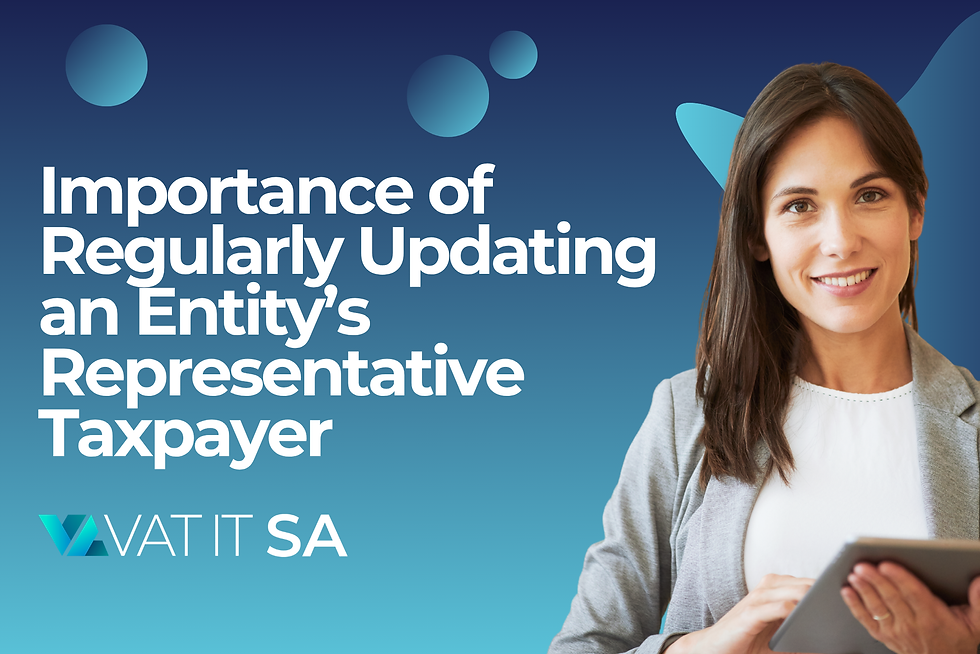Recent income tax amendments impacting your provisional tax return?
- Nadia van Aswegen

- Jun 8, 2022
- 3 min read
Updated: Jun 14, 2022

For years of assessment commencing on or after 1 April 2022, the South African corporate income tax rate was reduced to 27%. However, to fund this relief, the following measures were implemented to broaden the corporate income tax base:
(i) a restriction on the utilization of assessed losses (accumulated income tax losses); and
(ii) amendments to the limitation of interest deductions in respect of certain debt balances.
Many taxpayers are aware of the change in the tax rate but have not yet considered the impact of the accompanying base broadening measures. We highlight the fact that numerous taxpayers that have previously not paid provisional tax will for the first time be in a tax paying position. This is also an important aspect to consider when preparing cash-flow forecasts.
Below, we briefly outline the amendments to the utilization of assessed losses (section 20) and the limitation of interest deductions in respect of debts owed to persons not subject to tax (section 23M). These amendments come into effect on the same date as the reduction in the corporate income tax rate and will apply to companies with a year of assessment commencing on or after 1 April 2022.
Assessed loss limitation:
Section 20 of the Act governs the set-off of assessed losses generated by any person from the carrying on of a trade. Historically the section made provision for any assessed losses of a taxpayer to be carried forward and set-off against taxable income generated by a taxpayer until such time that the assessed loss is depleted.
The Act was amended to limit the carry forward of a balance of an assessed loss from a previous year to not exceed the higher of R1 million or 80% of the amount of taxable income before the set-off of the assessed loss. As a result, many companies with an assessed loss that exceeds its taxable income will be a tax paying position.
Interest limitation rules:
Companies with cross-border financing arrangements should be mindful of the new provisions of section 23M. In broad terms, section 23M aims to limit excessive interest deductions on debt owed to a creditor which is not subject to tax in South Africa. The amended rules expand the scope of section 23M which will result in a larger amount of debt being affected by the interest limitation rules. It is imperative for companies to determine the origin of cross-border financing arrangements to establish if the limitation rules will apply to interest incurred.
Some of the key aspects to consider in determining if the interest limitation rules will apply to cross-border debt balances are as follows:
1. Balances that constitute interest.
The definition of interest has been expanded and now includes the following:
· Interest as defined in section 24J;
· Payments made under interest rate swap agreements;
· Finance cost element of finance lease payments;
· Taxable foreign exchange gains or losses in respect of such debt; and
· Amounts deemed to be interest under Sharia compliant financing arrangements.
2. Relationship between the debtor and creditor
Interest bearing debt owed to the following creditors will be subject to the provisions of the amended section 23M:
· A creditor that is in a controlling relationship with the debtor;
· A creditor that is not in a controlling relationship with the debtor but obtained funding from a person in a controlling relationship with the debtor;
· A creditor that is not in a controlling relationship with the debtor but is part of the same group of companies as the debtor (applying a test of holding of more than 50% of shares); or
· A creditor that is in a controlling relationship with the debtor and
o the creditor directly or indirectly through another creditor
o that is in a controlling relationship with that first creditor,
o obtained funding for the debt that was advanced to the debtor
o from a person that is in a controlling relationship with either of the creditors.
A controlling relationship exists where a person directly or indirectly holds 50% or more of the equity shares of a company or can exercise at least 50% of the voting or participation rights.
3. The level of tax on the interest
The interest incurred must not be subject to SA tax including withholding tax at a rate less than 15% in the hands of the creditor.
Companies should determine whether they have any qualifying debt based on the above and, if so, establish whether any of the interest will be subject to the limitation as provided for in section 23M.
Contact our team of specialists at info@vatitsa.co.za should you require more information regarding these amendments and the impact it may have on your company’s provisional tax calculations.
Article by:
Nadia van Aswegen
Corporate Tax Director



Comments